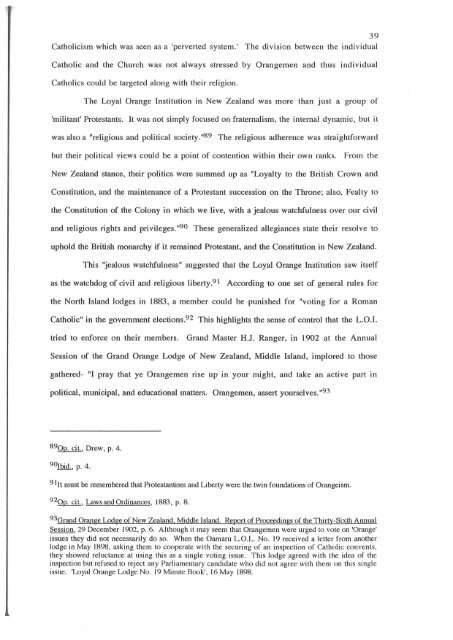TRANSPLANTED IRISH INSTITUTIONS - University of Canterbury
TRANSPLANTED IRISH INSTITUTIONS - University of Canterbury
TRANSPLANTED IRISH INSTITUTIONS - University of Canterbury
You also want an ePaper? Increase the reach of your titles
YUMPU automatically turns print PDFs into web optimized ePapers that Google loves.
39<br />
Catholicism which was seen as a 'perverted system.' The division between the individual<br />
Catholic and the Church was not always stressed by Orangemen and thus individual<br />
Catholics could be targeted along with their religion.<br />
The Loyal Orange Institution in New Zealand was more than just a group <strong>of</strong><br />
'militant' Protestants. It was not simply focused on fraternalism, the internal dynamic, but it<br />
was also a "religious and political society. "89 The religious adherence was straightforward<br />
but their political views could be a point <strong>of</strong> contention within their own ranks.<br />
From the<br />
New Zealand stance, their politics were summed up as "Loyalty to the British Crown and<br />
Constitution, and the maintenance <strong>of</strong> a Protestant succession on the Throne; also, Fealty to<br />
the Constitution <strong>of</strong> the Colony in which we live, with a jealous watchfulness over our civil<br />
and religious rights and privileges. "90 These generalized allegiances state their resolve to<br />
uphold the British monarchy if it remained Protestant, and the Constitution in New Zealand.<br />
This "jealous watchfulness" suggested that the Loyal Orange Institution saw itself<br />
as the watchdog <strong>of</strong> civil and religious liberty.91 According to one set <strong>of</strong> general rules for<br />
the North Island looges in 1883, a member could be punished for "voting for a Roman<br />
Catholic" in the government elections.92 This highlights the sense <strong>of</strong> control that the L.O.I.<br />
tried to enforce on their members.<br />
Grand Master H.J. Ranger, in 1902 at the Annual<br />
Session <strong>of</strong> the Grand Orange Lodge <strong>of</strong> New Zealand, Middle Island, implored to those<br />
gathered- "I pray that ye Orangemen rise up in your might, and take an active part in<br />
political, municipal, and educational matters. Orangemen, assert yourselves. "93<br />
89Op. ciL, Drew, p. 4.<br />
9OJbid., p. 4.<br />
911t must be remembered that Protestantism and Liberty were the twin foundations <strong>of</strong> Orangeism.<br />
nOp. ciL, Laws and Ordinances, 1883, p. 8.<br />
93Grand Orange Lodge <strong>of</strong> New Zealand, Middle Island. Report <strong>of</strong> Proceedings <strong>of</strong> the Thirty-Sixth Annual<br />
Session, 29 December 1902, p. 6. Although it may seem that Orangemen were urged to vote on 'Orange'<br />
issues they did not necessarily do so. When the Oamaru L.O.L. No. 19 received a letter from another<br />
lodge in May 1898, asking them to cooperate with the securing <strong>of</strong> an inspection <strong>of</strong> Catholic convents,<br />
they showed reluctance at using this as a single voting issue. This lodge agreed with the idea <strong>of</strong> the<br />
inspection but refused to reject any Parliamentary candidate who did not agree with them on this single<br />
issue. 'Loyal Orange Lodge No. 19 Minute Book', 16 May 1898.
















